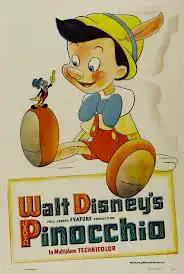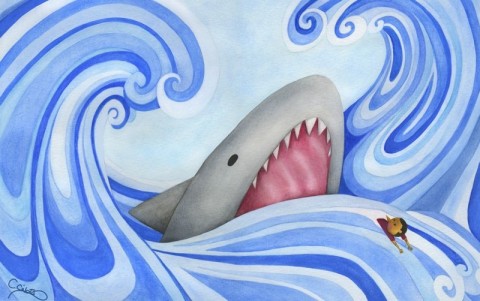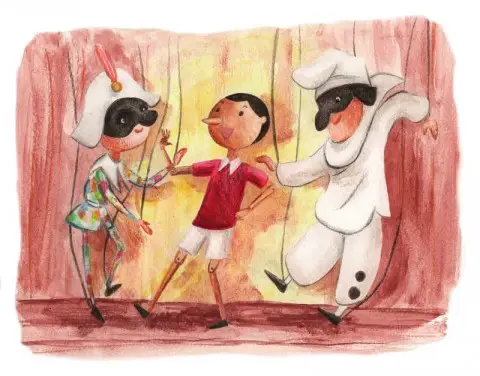Pinocchio Disney Real Boy Pinocchio Real Boy Pinocchio Real Boy Geppetto Father Family
The Real Pinocchio and the Disney Pinocchio

Storynory's audio narration of all the chapters of Pinocchio can exist found here.
What image does the name Pinocchio conjure upwardly in our minds? We tin't assist but think of the piffling male child-puppet fatigued by Disney. He looks a lot similar a cute kid, and just a little similar a wooden puppet. He has friend, the avuncular Jiminy Cricket, who plays the part of his censor, and who sings a schmaltzy song nigh wishing upon a star. Like all kids, he is charmingly naughty, but unlike real children, his nose has a trend to abound whenever he tells a childish fib. In short, Pinocchio has become synonymous with Disney's cosmos released in 1940. Pinocchio was the principal animator'due south second characteristic-length motion picture, and is widely seen equally a technical triumph and a landmark in the history of cinema. Only has it done whatever favours to the original Pinocchio, the character in the book?
Other children's classics, such as Alice'south Adventures in Wonderland and The Wonderful Sorcerer of Oz, seem to have survived the Hollywood treatment. People enjoy the movies but still turn to the original texts. But the impression we get from Disney's Pinocchio is of a cute story for little children. It was all very well to watch it when we were four years one-time, merely nosotros probably are not going to pick up the book.
In actual fact, if we do plow to the original text by Carlo Collodi (published betwixt 1881 and 1883), we are in for some surprises - shocks fifty-fifty. Near the beginning ii old men most come to blows. The dialogue is pretty pugnacious likewise:
"Geppetto, exercise not insult me or I shall telephone call you Polendina."
"Idiot." "Polendina!" "Donkey!" "Polendina!" "Ugly monkey!"
"Polendina!"
On hearing himself called Polendina for the third fourth dimension, Geppetto lost his head with rage and threw himself upon the carpenter. Then and there they gave each other a sound thrashing.
The action keeps on coming thick and fast. Later on a handful of capacity, Pinocchio'southward father, Geppetto, has been arrested and carted off to jail, and Pinocchio himself has killed the Talking Cricket by throwing a hammer at him. Pinocchio is very virtually burned on the fire past a brutal boob primary. He falls in with some ruthless bandits who hang him from a tree. But half manner through the book, it seems that our boob has been left dangling, and is dead : a not entirely unjust punishment for disobeying his loving, generous and expert father at every possible turn.
If the exhuberant violence comes as a surprise, and then besides does the depth and resonance of the story. There is nothing shallow about the way it is conceived. There are clear influences that place information technology in the mainstream of art.
The Bible.
Italy was and still is a thoroughly Catholic country. The influence of the Bible is everywhere in Pinocchio. A profligate boy who disobeys his father is surely a version of the Dissipated Son? The famous parable ( (Luke 15:xi-32) tells the story of a son who leaves his father and throws away money on an easy life, earlier eventually returning home with his tail between his legs. Information technology'southward an allegory for the human relationship betwixt the merciful God and sinning mankind. Is this not the story of Pinocchio besides?

A graphic symbol who spends time inside the belly of a giant sea-animate being reminds us of the Old Testament story of Jonah and the Whale (The Book of Jonah). It'southward a sort of rebirth. The sinful character suffers an experience that would ordinarily be fatal, but later on 3 days and nights he lives again. (Run across Matthew 12: 39-41 for the explicit parallel between Jesus and Jonah ). Pinocchio even meets his father inside the Shark, just equally Jonah came close to God during his ordeal inside the Whale.
Throughout the book nosotros constantly experience that Pinocchio is a lovable sinner who is failing to live up to the expectations of his kind and forgiving father. This is surely parallel to the relationship between mankind and God. In the Bible, God fashioned Adam out of clay, just as Geppetto makes Pinocchio out of wood. God allows Adam to have his ain will - but as Pinocchio the puppet is costless to do right or wrong
Our all besides human puppet has a kind and merciful female parent as well. Is not the Proficient Fairy similar rather similar Mary? At one point Pinocchio is hanged from a tree - not exactly executed between 2 bandits like Jesus - merely certainly strung up by ii thieves, the Fox and the Cat.
Carlo Collodi intended to end his story after xv episodes with Pinocchio expressionless on the tree. The editor of journal that was serialising Pinocchio begged for more. Pinocchio is rescued from the tree by the Good fairy. Information technology turns out that he was then shut to death that even three doctors cannot hold on his exact condition.
Plato
The Greek Philosopher Plato compared a human existence to a puppet created past the gods (Laws 1: 644).
"Our impulses are like cords and strings, which pull us different and contrary ways, and to reverse actions; and herein lies the divergence between virtue and vice."
How similar Pinocchio that is ! He is always running off in a new direction driven by a sudden impulse. He has gratuitous will, simply simply if he can overcome his desires which direct him similar strings fastened to his legs and arms. He is not really bad, but weak.
The passage was widely quoted effectually the time that Pinocchio was written, including in a volume on the history of the puppet theatre written by ane of Collodi's Tuscan friends. (Pietro Coccoluto Ferrigni : Yorick, Son of Yorick - as cited in An Essay on Pinocchio, by Nicholas J Perella in his Italian / English edition of Pinocchio.)
The Boob Theatre

We must non forget the puppet theatre itself, which is of course a direct influence on the pace and knock-nigh humour of Collodi's style. Have you ever seen a Dial and Judy show? The nib-nosed Punch is in fact a cousin of the Italian Pulcinella or Punchinello. We get a glimpse of the boob theatre in Chapter 10 of Pinocchio:
"Harlequin and Pulcinella were reciting on the stage and, as usual, they were threatening each other with sticks and blows."
Yes, the Italian Puppet theatre, like the British Punch and Judy, was pretty violent. The fight between the 2 quondam men in Chapter 2 of Pinocchio could almost be a scene out of information technology:
"And growing angrier each moment, they went from words to blows, and finally began to scratch and bite and slap each other. When the fight was over, Mastro Antonio had Geppetto'southward yellow wig in his hands and Geppetto plant the carpenter's curly wig in his oral fissure."
The fast pace of Pinocchio as well as the knocks and blows - all these come up from the Boob shows. When our marionette throws a hammer at the sanctimonious talking Cricket, he is behaving but boob on the stage would exercise.
The French critic Paul Gamble wrote in his wonderful survey of children's literature, "Books, Children and Men.""
"Before he was called Pinocchio and amused youngsters, he was Harlequin, PUnchinello or Stenterello. He was one of the maschere, changeless characters that served as a fixed bespeak for improvisation."
More on the history of Punch and Judy, here, inlcuding a quote from the diariest Samuel Pepys who calls it "The Italian boob play".
Commedia Dell'Arte and New Comedy.
The Italian Puppet theatre grew out of an older Italian dramatic tradition called Commedia Dell'Arte. It featured stock characters - such as foolish quondam men, tricky servants, drunkard cooks, and blustering soldiers. London's National Theatre has some videos near Commedia Dell'Arte hither.
These plots and characters in turn had their roots in Roman and Greek New Comedy (Plautus, Terrance, Menander). It's very much a feature of New Comedy that young men are basically hot-headed, behave in a spendthrift and irresponsible way and disobey their parents - a good instance would exist the Brothers by Terrance. They are not and then bad as to lose our sympathy, but certainly are driven by their impulses and emotions.
Italy and Tuscany itself
Paul Gamble, who was steeped in Italian civilization, wrote in his Books Children & Men:
"Pinochio is not only Italian, he is Tuscan... I challenge you to find a Tuscan who is non witty and spirted. All of the, fifty-fifty the common people, fifty-fifty the peasants, even the youngesters, have a flair for detecting the ridiculous, seizing any gamble to launch a witticism. Witicisms, absurd associations of dieas, humerous observations are to be found on every page of Pinocchio; an exhuberant imagination that is not only comical but keen; a mixture of of apparent naivete and caustic shrewdness."
This is i of my favourite examples :
"What shall I call him?" he said to himself. "I recall I'll call him PINOCCHIO. This name will brand his fortune. I knew a whole family unit of Pinocchi once–Pinocchio the begetter, Pinocchia the female parent, and Pinocchi the children–and they were all lucky. The richest of them begged for his living."
Information technology is non only Tuscany'due south caustic wit that is is evident, but enough of moralising likewise. The text is chock with proverbs -
"In this world, fifty-fifty every bit children, we must accustom ourselves to eat of everything, for we never know what life may hold in store for us!" Chapter 7
"A human, remember, whether rich or poor, should practise something in this world." - chapter 25
"In this world, what is given is always returned." - Chapter 28
"We are in this world to assist one some other" - chapter 29
But but incase we get too cocky-righteous, we should see if we feel comfortable with Pinocchio when he becomes "good" and starts to use moralising proverbs to justify his lack of pity for his former enemies in the final chapter (36)
It was the Fob and the Cat, but one could hardly recognize them, they looked so miserable. The Cat, after pretending to be blind for so many years had really lost the sight of both eyes. And the Fob, old, thin, and virtually hairless, had fifty-fifty lost his tail. That sly thief had fallen into deepest poverty, and one twenty-four hour period he had been forced to sell his cute tail for a bite to eat.
"Oh, Pinocchio," he cried in a bawling vocalisation. "Give us some alms, nosotros beg of you lot! Nosotros are old, tired, and ill." "Sick!" repeated the True cat. "Addio, false friends!" answered the Marionette. "You cheated me once, but yous will never catch me again." "Believe us! Today we are truly poor and starving." "Starving!" repeated the Cat. "If you are poor; you lot deserve it! Recollect the old proverb which says: 'Stolen money never bears fruit.' Addio, fake friends." "Have mercy on u.s.a.!" "On us." "Addio, faux friends. Remember the old proverb which says: 'Bad wheat always makes poor bread!'" "Do not abandon us." "Carelessness united states of america," repeated the Cat.
"Addio, false friends. Remember the sometime proverb: 'Whoever steals his neighbour's shirt, commonly dies without his own.
The naughty puppet turned preachy moraliser is really very funny, even though the scene itself is quite troubling. Similar all great literature, Pinocchio gives us shades of gray rather than like shooting fish in a barrel blackness and white.
I hope this is enough to convince you that there is far more to Pinocchio than met Disney'south heart. It'due south a rich text with deep roots in tradition and Italian civilisation. On a larger calibration the tale is an allegory for human nature. We are driven past our impulses, emotions, and weaknesses. Nosotros are free, but we are non free, because our personalities determine how we volition act. Only you lot have to read the text, or listen to Natasha'south wonderful performance of Pinocchio, to appreciate how warm, witty, inventive, heady and touching the original book is.
Source: https://www.storynory.com/the-real-pinocchio-and-the-disney-pinocchio/
0 Response to "Pinocchio Disney Real Boy Pinocchio Real Boy Pinocchio Real Boy Geppetto Father Family"
Post a Comment